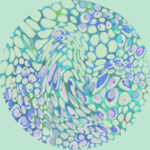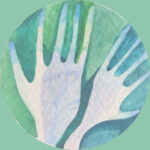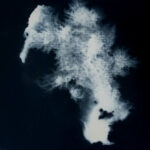Visualizing
the Virus
From Recording Black Death to Celebrating Living Data
Creativity, COVID 19, and Community Care
While there are many concerns that the COVID-19 pandemic has brought into focus, record-keeping, data, and the disproportionate effect that the virus has had on indigenous and Black communities are at the forefront of my mind. More than ever, recording health data and statistics has become the new normal, and these records and statistics reflect the many ways that the virus has affected Black communities. However, much of this data collection has focused on reproducing narratives of Black death and disease rather than expressing a care-filled concern towards the realities of living through, and not just dying from, the pandemic.
Therefore, The Black Living Data Booklet (or #BLDB) was created to help researchers, students, and community members approach the creation and consumption of media, information, and data a bit differently through a better understanding of discernment and care. As a Manifesto, the BLDB is a collection of statements about the importance of performing research and writing in a way that is more conscious of the history and harms of data collection and analysis, especially for Black communities within institutions of health and higher learning.
The primary principles outlined in the booklet focus on the importance of recognizing that data is not just objective numerical findings, but that data creates stories about communities. Within the era of COVID-19, the constant deluge of data and statistics on racial health disparities have constructed stories which refuse to celebrate Black health and wellness and that blame Black communities for health disparities. Therefore, the Black Living Data Booklet privileges the records of the living and demonstrates that communities have the power to counter the findings of data science through their own stories.
Built on a feminist ethics of caring about research and communities and exemplifying a more intersectional approach to working with both information and individuals, this project models how researchers, students, and community members can engage in more critical and care-filled approaches to data collection, curation, and critique.
Intersectionality and Data Activism
Specifically, this work was inspired by the essay “Black Data” in which Shaka McGlotten writes that:
I use Black Data to think through some of the historical and contemporary ways that Black queer people, like other people of African descent and people of color more broadly, are hailed by big data, through which techniques of race and racism reduce our lives to mere numbers. (McGlotten)
Here, McGlotten calls for an understanding of Black queer practices which deconstruct data as a purely numerical concept by providing examples that focus on art and stories. Caring for and about Black Living Data is then a push to understand the many intersections and identities inherent to Black communities, as well as their many cultural productions. As a response to the hail of health data, these projects focus on how Black community members can create their own calls to action.
How can we use data for activism?
Offering multiple examples of how communities can use data collection for activism, the Black Living Data Booklet includes exercises (called ‘demonstrations’), that teach about data and media literacy through news and social media use, as well as how community members can do their due diligence when decoding information and data. As COVID-19 has introduced many individuals outside of the realms of data science and analysis to the collection of health data, these demonstrations offer simple steps to teach Black community members how to interpret the data they see on the news and other platforms.
Through these demonstrations, I view the booklet as a resource which can also help influence our understanding of data collection and creation as not just something that researchers and institutions do, but as something that is accessible to many different groups. Including demonstrations focused on the collection and curation of data for Black community members, the booklet also offers examples of how people can think about curating their own community data through archiving ethnographies, mapping, and a variety of other data collection techniques.
In challenging recurring narratives of Black death from COVID-19, the Covid Confessions project is one example of what it looks like to construct a digital archive or record of Black life in the era of COVID-19. Through focusing on the collection of art, storytelling, and the digitization of materials, this collection concludes by encouraging community members to construct their own COVID Confessions project(s). Therefore, the Black Living Data Booklet and the COVID Confessions project work together to demonstrate how a celebration of Black life and data can still be found even in the midst of rising data on racial trauma and Black death.







